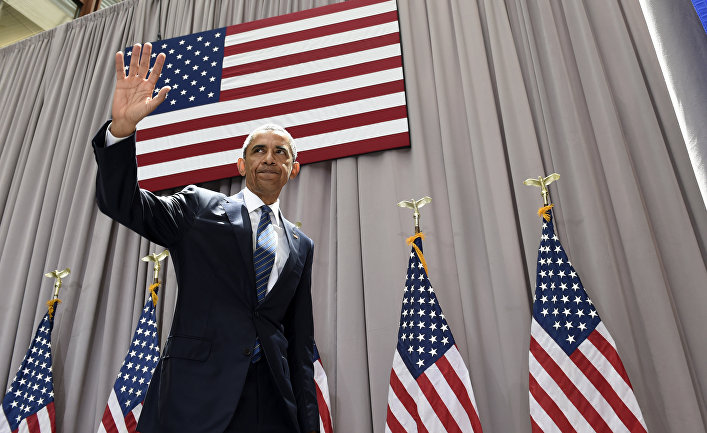After the Democratic Party suffered a defeat in the US mid-term elections in November 2014, President Barack Obama shifted his focus to accumulating his own political legacy. In foreign affairs, the US is normalizing the relations with Cuba and Washington expressed ‘strong’ commitment to settle its differences with Iran. Obama’s recent “homecoming” to Kenya is widely seen as a positive step to further strengthen the US-Africa relations. However, facing with a sustained deterioration in relations between the US and Russia, Obama hasn’t shown any intention to make any changes to improve the situation.
In March of this year, as soon as the first round of economic sanctions against Russia was due, Barack Obama issued the order to extend the sanctions for one more year in response to Russia’s actions in Ukraine. According to the US government, Russia has been undermining democratic processes and institutions in Ukraine, threatening Ukraine’s peace, security, stability, sovereignty, and territorial integrity. Following the footsteps of the US, European Union made the decision to extend the sanctions as well, without giving the Russian President Vladimir Putin any respite.
The United States sees Russia not only as a threat to Ukraine and Eastern Europe, but also a threat that might endanger the US itself. The new Chairman of the Joint Chiefs of Staff, Joseph Dunford said Russia’s nuclear capability “combined with their recent behavior” make Russia, not ISIS, the primary threat to US security.
Putting Russia in the same category with ISIS, an extremist organization that everyone abominates, reveals that the US authority intends to make Russia its No.1 enemy. As a matter of act, the US is very particular in terms of creating enemies. The American historian, social critic, special assistant to President Kennedy Arthur M. Schlesinger, Jr. once said, the US needs an enemy to bring focus and continuity to its foreign policy. During the two World Wars, Germany was the enemy; during the Cold War, Soviet Union was the enemy. At some point, the US will declare the presence of other potential hostile.
Why does the US need an enemy? From the perspective of reality, in order to maintain its status of a prominent world power, the United States need to maintain a large regular army, this requires a hypothetical adversary. On the other hand, the US is the world’s biggest armament manufacturer; the produced weapons need to be used. Otherwise, the interests of the elite group cannot be maximized. Therefore, it is not difficult to explain why the US uses military intervention every few years.
From a strategic perspective, the graving for an enemy comes from the US’s needs to maintain its status as the world's leading power. American politicians believe that they are the law maker of the existing world order; the rise of another power must be challenging the existing order. To suppress such power will help the US to maintain the world balance for its own good. The more enemies the US defeats, the better to ensure its dominance in the world. When there isn’t such an adversary in reality, American politicians will try to create one by peddling various "threat theories”.
Schlesinger's prediction has become a reality. After the end of the Cold War, the United States started to look for the enemies all around the world. The US lit the flames of war from the Middle East to the Balkans. Before long, the US noticed that Russia is becoming stronger, so it immediately shifts the strategic focus to suppressing Russia. From the anti-missile system, Chechen wars, ”color revolution” in Eastern Europe and Central Asia to the Syrian crisis and Snowden affair, the United States along with NATO has been in dispute with Russia for more than ten years.
Nowadays, Ukraine, a country wavering between Russia and the west, became a chess piece in the US strategy pattern. Using Ukraine to suppress Russia is a solid choice for the US. Russia sees Ukraine as the last shield against the threat from the West. In response to Ukraine’s swinging to the West, Russia adopted the strategy of accepting Crimea and supporting the civil armed troops in Eastern Ukraine. This strategy elevates the conflicts between the US and Russia.
Facing reality of the situation, Russia is deeply aware that fighting the repression strategy of the United States is going to be a long battle. Russia's leaders have more than once emphasized that they don't count on the Western countries to terminate the sanctions against Russia. During the live Q&A session with the Russian public in April, Vladimir Putin pointed out that despite Russia’s efforts on implementing the new Minsk agreement, the West continues to launch sanctions against Russia. The sanctions no longer have anything to do with the situation in Ukraine, whether to lift the sanctions has clearly become a political issue.
In fact, the United States has no intention to conceal its strategic intent, which is to maintain the long-term tension with Russia. During a visit to Europe, America’s defense secretary Ashton Carter said that the US-NATO-Russian relations were most likely to remain intense even after Vladimir Putin leaves office. NATO would be preparing for the long period of tensions with Russia.
Obama’s policy in containing Russia is the same with his predecessors. Compared with Iran and Cuba, Russia’s economic and military power lives up to the title of America’s No. 1 enemy. For Obama, sealing a deal with Iran on nuclear issues, as well as normalizing the relationship with Cuba serve the interests of the US and can be counted as his own political legacy. But making an effort to ease the tension with Russia might not bring Obama any good, other than create suspicion and agitate critic of a compromise or surrender. Therefore, continuing to constantly contain Russia, uneager to repair the bilateral relations between the US and Russia is the legacy that Barack Obama hopes to leave to the next administration in the future.






